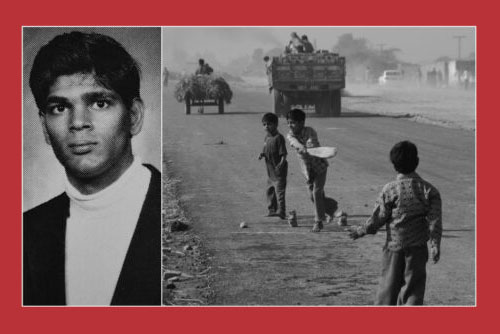The Goshen College Alumni Council and Yoder Public Affairs Committee hosted Shashi Buluswar ‘91, last Thursday, Oct. 1 during Homecoming, as a part of the new series: GC Talks.
Buluswar, CEO of the Institute for Transformative Technologies and a 2020 Culture for Service awardee, presented on the history of international service work and how it came to exist in the form most widely recognized today, which he says has included a shift away from reliance on foreign aid agencies.When Buluswar first arrived at Goshen College as a business and computer science major, the idea of culture for service was new to him, but he has since made it his own.
“In those days, the culture at GC seemed to explicitly tie the idea of service and values to Christianity,” he said in a previous interview. “It took some time after college for me to separate the two, and to learn that I could have strong values despite being an ardent atheist.”
With ITT, Buluswar and his team works towards identifying and manufacturing the breakthroughs in the technology field that are required for global development in a way that is also sustainable.
Buluswar himself has found that ITT’s work can barely begin to address all the need for electricity in the world.
“It’s not about showing up and building solar panels,” Buluswar said. “It’s about really understanding the confluence of power production, power consumption and what are the levels that you can impact?”
ITT has created a utility box and solar system alongside the electric power distribution company, Tata Power, to make a cheap smart system to bring solar energy to 25 million people.
“Let’s recognize that there are a billion people without electricity and this affects 25 million people,” Buluswar said.
He suggested that in any other high performing company, reaching a 2.5% market penetration would be a fireable offense, instead of something to be praised.
“The onerous is on us, particularly if we actually claim to care about the world,” Buluswar said. “If we claim to have a calling to service… we cannot pat ourselves on the back for a rounding error and 2.5% is the literal definition of a rounding error.”
Buluswar further invited his audience to consider what the response would be if the reverse were to occur.
“You graduate… and you’re going to show up in Kenya, Uganda, and you will say, ‘I’m here to solve poverty’… We applaud such initiatives, we give them awards… Let’s flip that around,” Buluswar said. “Let’s say that the top graduate from the top university in Kenya showed up in the U.S. and said, ‘Hey, I want to help solve poverty.’ What would our reaction be?”
Bulusawar noted parallels between countries that were under colonial rule for long periods of time and then left to fend for themselves and countries that are at the bottom of the developing world today.
“We can’t fix the pervasive effects of colonialism with a kinder, gentler, benign form of colonialism,” Buluswar warns.
This same question of decolonizing service has influenced Goshen’s Study-Service Term.
“The issue of decolonization is an important one and we should always be mindful of our privilege as we travel abroad — taking on a stance of cultural humility and respect toward our hosts in all that we do. Perhaps the biggest thing we can do toward decolonization is to decolonize our own minds,” said Jan Bender Shetler, director of international education.
Shetler went on to explain that one of the best ways to do this is to be exposed to different perspectives by living and working alongside those in situations that involve depending on others.
“While one might argue that we can learn this from a distance, forming close relationships and caring for others is perhaps the biggest incentive for actually doing something about the inequities in the world once you return home,” she said. “Systemic global injustices observed first hand are not easily forgotten or rationalized away.”
Over the past 15 years, the SST program has switched from having students think of themselves as really “doing” things as opposed to simply “being” there.
One step in this change came in the renaming of ‘service’ SST courses to ‘community-engaged learning,’ Shetler said.
“We recognize that students are not yet professionals and that they will only assist in whatever the organization is already doing,” she said. “This is a way for students to more deeply engage the community by being part of something already happening there. On the other hand, we want this to be a reciprocal partnership — that the organization will also benefit from the help our students can give.”
Shetler found that Buluswar’s talk was a good reminder that having good intentions isn’t enough.
“This is not something we solve once but are constantly attentive to as we evaluate power dynamics in all our programs,” she said.


